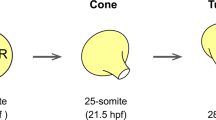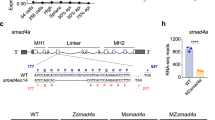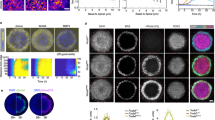Abstract
EXAMPLES of lateral asymmetry are often found in vertebrates, such as the heart being on the left side, but the molecular mechanism governing the establishment of this left–right (L–R) handedness is unknown1. A diffusible morphogen may determine L–R polarity2, but a likely molecule has not so far been identified. Here we report on the gene lefty, a member of the transforming growth factor-β family, which may encode a morphogen for L–R determination. Lefty protein contains the cysteine-knot motif3 characteristic of this superfamily4,5 and is secreted as a processed form of relative molecular mass 25K–32K. Surprisingly, lefty is expressed in the left half of gastrulating mouse embryos. This asymmetric expression is very transient and occurs just before the first sign of lateral asymmetry appears. In the mouse mutants iv and inv, which cause situs inversus, the sites of lefty expression are inverted, indicating that lefty is downstream of iv and inv. These results suggest that lefty may be involved in setting up L–R asymmetry in the organ systems of mammals.
This is a preview of subscription content, access via your institution
Access options
Subscribe to this journal
Receive 51 print issues and online access
$199.00 per year
only $3.90 per issue
Buy this article
- Purchase on Springer Link
- Instant access to full article PDF
Prices may be subject to local taxes which are calculated during checkout
Similar content being viewed by others
References
Brown, N. A., McCarthy, A. & Wolpert, L. in Biological Asymmetry and Handedness 182–201 (Wiley, Chichester, 1991).
Brown, N. A. & Lander, A. Nature 363, 303–304 (1993).
McDonald, N. Q. & Hendrickson, W. A. Cell 73, 421–424 (1993).
Kingsley, D. M. Genes Dev. 8, 133–146 (1994).
Hogan, B. L. M. et al. Development suppl. 53–60 (1994).
McBurney, M. W. & Rogers, B. J. Devl. Biol. 89, 503–508 (1978).
Saijoh, Y. et al. Genes to Cells (in the press).
Pear, W. S. et al. Proc. natn. Acad. Sci. U.S.A. 90, 8392–8396 (1993).
Hummel, K. P. & Chapman, D. B. J. Hered. 50, 9–13 (1959).
Layton, W. M. J. Hered. 67, 336–338 (1976).
Yokoyama, T. et al. Science 260, 679–682 (1993).
Brueckner, M. et al. Proc. natn. Acad. Sci. U.S.A. 86, 5035–5039 (1989).
Brown, N. A. & Wolpert, L. Development 109, 1–9 (1990).
Levin, M. et al. Cell 82, 803–814 (1995).
Zhou, X. et al. Nature 361, 543–547 (1993).
Mizusima, S. & Nagata, S. Nucleic Acids Res. 18, 5322 (1990).
Wilkinson, D. G. in In Situ Hybridization: A Practical Approach 75–84 (IRL, Oxford, 1992).
Theiler, K. in The House Mouse: Atlas of Embryonic Development 40–42 (Springer, New York, 1989).
Author information
Authors and Affiliations
Rights and permissions
About this article
Cite this article
Meno, C., Saijoh, Y., Fujii, H. et al. Left–right asymmetric expression of the TGFβ-family member lefty in mouse embryos. Nature 381, 151–155 (1996). https://doi.org/10.1038/381151a0
Received:
Accepted:
Issue Date:
DOI: https://doi.org/10.1038/381151a0
Comments
By submitting a comment you agree to abide by our Terms and Community Guidelines. If you find something abusive or that does not comply with our terms or guidelines please flag it as inappropriate.



